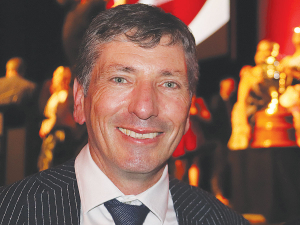McIvor moving to OSPRI
Beef + Lamb New Zealand chief executive for the past eight years, Sam McIvor is heading for new pastures at Ospri, which runs NZ’s integrated animal disease management and traceability service.
 Sam McIvor says one of the challenges posed by the logistics problems is having product in market for special occasions – such as cultural festivals.
Sam McIvor says one of the challenges posed by the logistics problems is having product in market for special occasions – such as cultural festivals.
Beef+Lamb NZ chief executive Sam McIvor says the word he's getting from the meat exporters is that one of their most time consuming tasks is logistics.
He says they are using every tool in the box to deal with the issue and it is a major focus of their respective businesses.
One of the challenges, posed by the logistics problems, is having product in market for special occasions - such as cultural festivals. The Chinese New Yeas, Christmas and Easter are some of the larger ones. McIvor says getting the supply chain issues right is critical.
"But I think, to be fair, globally everyone is getting a little more tolerant of the fact that if a product doesn't turn up tomorrow, so be it," he told Rural News. "But there is also the risk that if people don't have the product when they want it, they will switch to an alternative and may not come back to the original one. So yes, there are risks about our ability to supply customers and what that might mean over time."
McIvor notes that NZ's meat industry is still in the middle of its busiest time of the year for processing stock. And with some areas hit by drought, farmers are having to talk to their processing companies as soon as they can to book space.
"But unlike last year, when about 70% of the country was in drought, it's not that bad this year - which does provide some options," he says.
"For example, farmers on the west coast of the North Island are saying they have had their best season ever. So, I think there are probably options other than slaughter."
McIvor says farmers are are getting better at managing climate change by investing in better stock classes and making early decisions. He says productivity in the sheep and beef sector has increased massively resulting in the same number of lambs being produced from fewer capital stock.
"During the dry period we don't have the same pressure now on our farm systems."
McIvor believes that farmers are also taking a much more holistic approach to their farming operations. Taking on board the needs and views of customers, who are focusing on products that take into account climate and envrionmental issues.
He notes the emphasis has ramped on such things as essential fresh water and biodiversity, and farmers in turn want to do the right thing and incorporate these requirements into their business plans.
South Waikato farm manager Ben Purua’s amazing transformation from gang life to milking cows was rewarded with the Ahuwhenua Young Maori Farmer award last night.
Bankers have been making record profits in the last few years, but those aren’t the only records they’ve been breaking, says Federated Farmers vice president Richard McIntyre.
The 2023-24 season has been a roller coaster ride for Waikato dairy farmers, according to Federated Farmers dairy section chair, Mathew Zonderop.
Ministry for Primary Industries (MPI) director general Ray Smith says job cuts announced this morning will not impact the way the Ministry is organised or merge business units.
Scales Corporation is acquiring a number of orchard assets from Bostock Group.
Family and solidarity shone through at the 75 years of Ferdon sale in Otorohanga last month.

OPINION: This old mutt well remembers the wailing, whining and gnashing of teeth by former West Coast MP and Labour…
OPINION: Your canine crusader gets a little fed up with the some in media, union hacks, opposition politicians and hard-core…